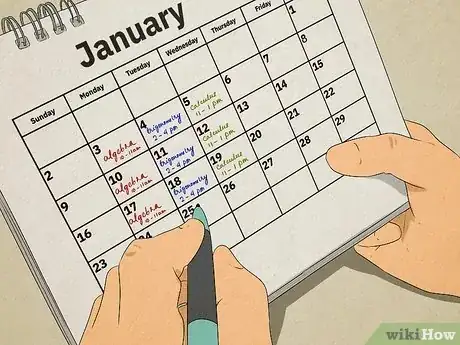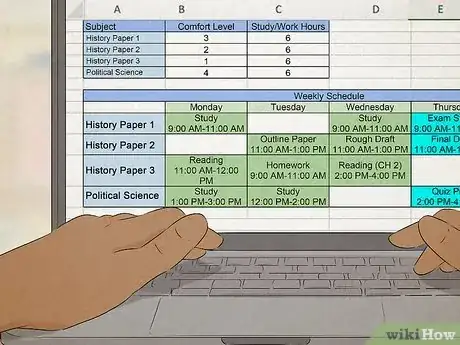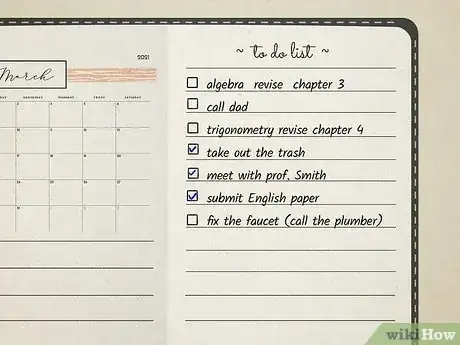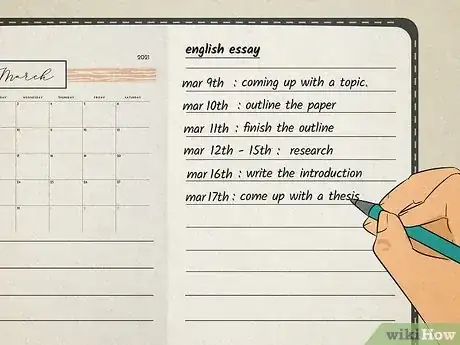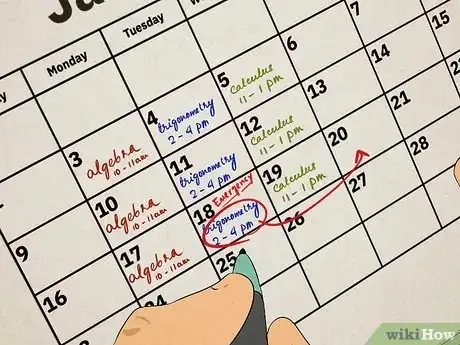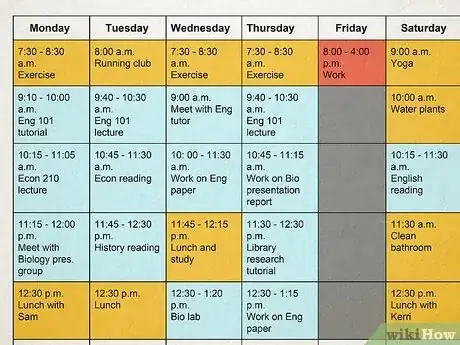This article was co-authored by Alexander Ruiz, M.Ed.. Alexander Ruiz is an Educational Consultant and the Educational Director of Link Educational Institute, a tutoring business based in Claremont, California that provides customizable educational plans, subject and test prep tutoring, and college application consulting. With over a decade and a half of experience in the education industry, Alexander coaches students to increase their self-awareness and emotional intelligence while achieving skills and the goal of achieving skills and higher education. He holds a BA in Psychology from Florida International University and an MA in Education from Georgia Southern University.
There are 12 references cited in this article, which can be found at the bottom of the page.
wikiHow marks an article as reader-approved once it receives enough positive feedback. This article has 14 testimonials from our readers, earning it our reader-approved status.
This article has been viewed 245,460 times.
The transition from high school to college can be challenging as you learn how to navigate a new, less scheduled learning environment. If you find yourself wishing for more hours in the day, learning time management skills can help you find that extra time and cut down on stress. By figuring out your time needs and minimizing distractions, you can plan a schedule that will help you succeed in college while still having fun.
Steps
Making a Schedule
-
1Find a paper or digital calendar system. Before you begin making a schedule for yourself you want to find a calendar system that’ll allow you to plot out both long and short-term activities. It is important to have just one calendar where you can store all of your information for easy reference.[1]
- Digital calendars can be very useful since they can be linked to many electronic devices, allowing you to access them at any point.[2]
- A calendar that has a monthly overview followed by a weekly breakdown would be very useful for long and short-term planning.
-
2Sketch out deadlines for your semester. Once you’ve got your hands on the schedules for all of your courses, put all assignment due dates, exams, and homework on your calendar. This will help you be aware of what weeks or months of the semester will be particularly busy so you can plan ahead.[3]
- If you know in advance that you’ve got three midterms in one week, you’ll tell that friend who asks you to go on a weekend trip that you can’t go until later.
Advertisement -
3Plan a weekly schedule. Now that you’ve got a roadmap of your semester, you can begin planning out a schedule to prepare yourself for those crunch times. Make a weekly priority list that takes both daily homework assignments and larger projects into account.[4] You can break down larger projects into more manageable chunks so you’re not overwhelmed.
- If you have a research paper due at the end of the semester, for example, don’t procrastinate until the week before it’s due! Use your weekly schedule to budget in time for library research, an outline, and a rough draft. If you think it’ll take you six weeks to get this done, work backward from the due date to create deadlines for yourself.
- Use a sense of urgency and importance. Something really important and really urgent should be done immediately, while something that is not urgent but still important can be scheduled a little bit further in the future.[5]
-
4Create a daily to-do list. At the beginning of each week, sit down with your calendar and come up with a list of tasks you’d like to accomplish each day of that week. This will allow you to see how you will achieve your weekly goal.[6]
- Prioritize your daily tasks by marking them with an H, M, or L for high, medium, or low importance.
-
5Set reminders. It’s all too easy to miss deadlines or forget about study sessions. You’re a college student--you’ve got a lot going on! Use your phone or an online service to set daily, weekly, or special reminders for yourself. You could even go old school and leave post-it notes in places you’re likely to see them, like on your desk, door, or computer screen.[7]
-
6Break large tasks into manageable chunks. A 20-page research paper or 10 page math problem set feels like an impossible task when you first look at it. Instead of getting intimidated by big projects, break them down into a series of small steps.[8]
- For instance, if you’re starting a paper from scratch, schedule time on the first day for coming up with a topic. The second day, start a paper outline, and on the third day, finish the outline. For the next four days, you can start researching.
-
7Block out time for your job. Working during college can limit your study hours, but you can learn to manage your time by choosing a flexible job that will help you work around busy academic weeks.[9]
- Look for a job that has flexible hours, is online, or has a large number of employees with whom you could swap shifts with.
- Ask in advance about time off during times in the semester you know will be busy.
- Consider jobs that will let you work during times that you normally wouldn't study or attend class. For instance, if you like to study in the morning, take shifts at a restaurant in the evening. If you’re more of a late-night studier, lifeguard at a local pool in the mornings.
-
8Make time for sleep, well-balanced meals, exercise, and downtime. You can’t be a machine, so don’t try! Your mental and physical well-being will determine how successful you are in accomplishing your goals. Budget adequate sleeping time and don’t feel guilty if you schedule in some fun.[10]
- In fact, spending time doing a fun hobby can help you become more conscious of your time.
-
9Schedule in rewards. Did you just survive a brutal week of exams and papers? Make sure you build in a reward for all the hard prep work you’d done in the previous months to prepare for this difficult time.[11]
- You can use these rewards as a motivating tool as well.[12] If there’s a movie you’ve been dying to see in theaters, buy a ticket for a showtime at the end of your challenging week.
-
10Leave room for flexibility. Things happen. You’ll get sick, have a family emergency, or have to cover for a friend at work. If you plan some flexibility into your weekly schedule, you’ll manage to stay on top of your schoolwork while navigating life’s curveballs.[13]
Minimizing Distractions
-
1Know your best study time. A good method to minimize distractions is to schedule study time during the time of day when you are most focused. Are you a night owl? Early bird? Block off your most productive hours for studying.
- If you have a class you don’t like to study for, you should prioritize working on this course during the time of day you are most concentrated.
-
2Create a productive workspace for yourself. If you work well with music, play it in the background instead of using headphones. If you can’t deal with any background noise, invest in noise-cancelling headphones or find a quiet environment, like a library.[14] Steer clear of strong smells, low lighting, extreme temperatures, and chairs that are too comfortable, or not comfortable enough. If social media is too distracting, zip your phone into your bag.[15]
- Experiment with different workspaces to find what works best for you.
-
3Focus on one task at a time. Multi-tasking has both a physical and mental toll. You’ll lose time while trying to multi-task and you’ll lose in-depth engagement in the subject as well.[16]
-
4Use the Pomodoro Technique. This distraction-banishing time management strategy involves working hard for 25-minute intervals, called “Pomodoro,” then taking a short break. Continue working in these 25-minute slices until you’ve completed your task. Your reward? After 4 pomodoro worth of hard work, you can take a longer break--20-30 minutes.[17]
- No distractions allowed during your pomodoro! Remember, it’s only 25 minutes long. You can definitely stay off your phone for that long.
-
5Utilize those small amounts of time between activities. Do you have an awkward 20 minute gap between classes? Instead of pulling out your phone or taking a cat nap, grab your notes from the week before and review them.[18]
-
6Stay off the internet during your designated study hours. Avoid Instagram, Reddit, Pinterest, Twitter, and Facebook. Getting onto these social media sites will distract you and prolong study time.[19]
- Instead, use these sites during scheduled downtime. Or, better yet, schedule to see some of these people you follow online in person!
- If you can’t seem to keep yourself away from social media, alter your alert settings or have a friend change your password.
-
7Designate a study space. Studying in a place where you will feel relaxed and sleepy, like your bed, is not the best idea. Instead, find a location that has a desk, good lighting, and minimal distractions.[20]
- If you have a chatty roommate, head to a campus library or dorm study space.
Enlisting Help
-
1Start a study group. At the beginning of the semester, make a plan with some classmates to have a weekly study group. Studying in a group can be a very helpful learning environment, and it also makes studying more fun.[21]
-
2Find a writing partner. Do you have a big writing assignment? Find a friend who also has some serious writing to do and come up with a regular time to meet and write together. Even if you’re not in the same major, you can benefit from having a designated time to write and a person to swap drafts with.[22]
-
3Set limits with your friends and roommates. Tell your friends and roommates the times you’ve blocked off for study and ask them to leave you alone during those periods.
- Have an easy way to show your friends that you’re busy, such as a “Do Not Disturb” sign on your door.
Evaluating Your Time
-
1Monitor how you spend your time for a week. Keep a journal where you write down how much time you spend on every activity in your daily life. If you keep track of your time for a full week, you can pinpoint activities that dominate your daily routine.
-
2Sort your activities into groups. Once you’ve determined what types of activities you typically spend time on, sort them into larger categories.
- For example, you can have categories for academic, recreational, work, or social activities.
-
3Prioritize your needs. Once you’ve sorted your activities into groups you need to determine what categories need to take priority in your life. Managing time is all about balance, so dedicate more time in your life for activities that are most important for achieving your goals.[23]
- If you need to work to pay your rent and want to maintain a high GPA, you should prioritize spending more time on these sorts of activities.
References
- ↑ https://students.dartmouth.edu/academic-skills/learning-resources/time-management-tips
- ↑ https://students.dartmouth.edu/academic-skills/learning-resources/online-calendars
- ↑ Alexander Ruiz, M.Ed.. Educational Consultant. Expert Interview. 18 June 2020.
- ↑ Ted Coopersmith, MBA. Academic Tutor. Expert Interview. 10 July 2020.
- ↑ Alexander Ruiz, M.Ed.. Educational Consultant. Expert Interview. 18 June 2020.
- ↑ https://students.dartmouth.edu/academic-skills/learning-resources/time-management-tips
- ↑ https://students.dartmouth.edu/academic-skills/learning-resources/time-management-tips
- ↑ Ted Coopersmith, MBA. Academic Tutor. Expert Interview. 10 July 2020.
- ↑ https://www.cdu.edu.au/launchpad/future-study/six-tips-balancing-work-and-study
- ↑ https://learningcenter.unc.edu/tips-and-tools/managing-college-stress/
- ↑ https://socialsci.libretexts.org/Courses/HACC_Central_Pennsylvania's_Community_College/Introduction_to_the_College_Experience_(Burns_Ogle_Valentine)/04%3A_Goal-setting/4.03%3A_Rewarding_Yourself_When_You_Achieve_Your_Goals
- ↑ Alexander Ruiz, M.Ed.. Educational Consultant. Expert Interview. 18 June 2020.
- ↑ https://mcgraw.princeton.edu/effective-time-management
- ↑ Ted Coopersmith, MBA. Academic Tutor. Expert Interview. 10 July 2020.
- ↑ https://www.wgu.edu/blogpost/improve-online-study-environment
- ↑ https://mcgraw.princeton.edu/effective-time-management
- ↑ https://learningcommons.ubc.ca/the-pomodoro-technique-study-more-efficiently-take-more-breaks/
- ↑ https://learningcenter.unc.edu/tips-and-tools/studying-101-study-smarter-not-harder/
- ↑ https://learningcenter.unc.edu/tips-and-tools/studying-101-study-smarter-not-harder/
- ↑ Ted Coopersmith, MBA. Academic Tutor. Expert Interview. 10 July 2020.
- ↑ https://learningcenter.unc.edu/tips-and-tools/study-partners/
- ↑ https://mcgraw.princeton.edu/effective-time-management
- ↑ https://students.dartmouth.edu/academic-skills/learning-resources/time-management-tips
About This Article
To manage your time in college, start by creating a calendar and sketching out deadlines for the semester. Then, break things into more manageable chunks by coming up with a weekly plan and daily to-do lists. Make sure you build in time for the basics, like eating and sleeping, but don’t forget to include “down” time, since nobody can be productive all the time! Additionally, try to block out study times when you know you have good focus, like first thing in the morning. Then, study one thing at a time, and work in a quiet space to minimize distractions. For tips on how to find a writing partner or form a study group to help manage your time, read on!
